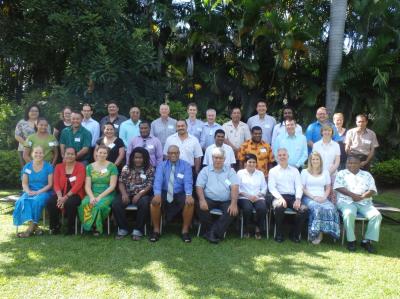
Friday 23 May 2014, Nadi, Fiji - Many Pacific Islands have excellent weather records that can be used to understand and predict events that affect our communities such as droughts, El Niño, La Niña, and sea level changes. Making this information more available and user-friendly is the critical next step that countries face.
Representatives from 11 Pacific Island meteorology services and land survey departments met in Nadi from 19 to 21 May to discuss this issue. The countries represented are all participants in the Australian-funded Climate and Oceans Support Program in the Pacific (COSPPac).
According to Programme Manager Janita Pahalad of the Australian Bureau of Meteorology, ‘COSPPac aims to support Pacific Islands’ ability to understand and apply scientific research on climate variability to national development plans.’
COSPPac’s implementing partners, the Australian Bureau of Meteorology, Geoscience Australia and the Secretariat of the Pacific Community through its Geoscience Division (GSD), have been providing products, training, and services to assist government agencies to apply climate and ocean research to national planning and decision-making.
Attention to climate is particularly relevant this year, as regional meteorology services have forecast that El Niño conditions are likely to develop in the next few months. The changes in sea level, ocean and air temperature, and the frequency and intensity of storms associated with El Niño can have a big impact on Pacific agriculture, health, fisheries, and tourism, among other sectors.
During this week’s meeting, participants reflected on their progress to date and laid down plans for the next two years.
‘I’ve really appreciated the flexibility of the COSPPac project,’ said Tonga’s Director of Meteorology, ‘Ofa Fa’anunu. ‘How we do things in Tonga or Niue or Samoa is totally different. One of the biggest successes of COSPPac is the way the capacity building has been done. The project team has been able to come to us and sit with us to understand our priorities.’
COSPPac will continue to support Pacific national met services and other sectors with climate and oceans services and capacity development through 2016.
Caption: Participants in the COSPPac Planning and Steering Committee Meeting, May 2014.ENDS
For more information, contact Molly Powers-Tora (email:
This e-mail address is being protected from spambots. You need JavaScript enabled to view it
)





